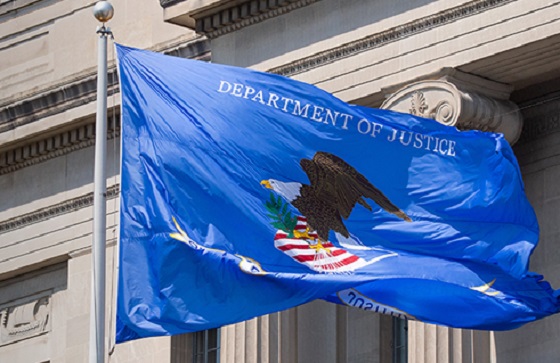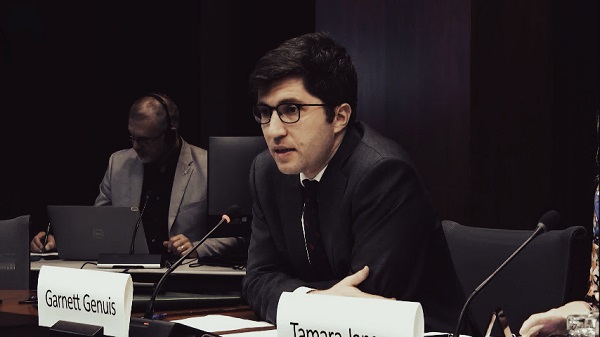espionage
Chinese spies arrested in California

From The Center Square
PRC operatives arrested in Guam during historic missile test
People’s Republic of China (PRC) and Chinese Communist Party (CCP) operatives and spies continue to be arrested in the U.S. The latest include two Chinese spies in California and several arrested in Guam near a U.S. military installation on the same day as an historic live ballistic missile interception test.
In California, a 64-year-old man was arrested on several charges including allegedly acting as a PRC agent while working as a campaign manager for a southern California city council candidate elected in 2022, according to the U.S. Department of Justice. The operative “allegedly discussed with Chinese government officials how the PRC could ‘influence’ local politicians in the United States, particularly on the issue of Taiwan” and was allegedly involved in operations “to combat ‘anti-China forces’ in the U.S., among other conspiracies.
He was also charged with conspiring with another PRC operative who was sentenced to prison last month for acting as an unregistered PRC agent and bribing an IRS agent. In that case, two PRC citizens living in Los Angeles were targeting members of the Shen Yun Performing Arts Center, a multi-agency investigation found.
In Guam, U.S. Customs officers arrested PRC citizens who illegally entered near a U.S. military installation, according to the Guam Customs & Quarantine Agency.
As part of their investigation, officers learned the PRC operatives were dropped off the coast of Guam by a vessel originating from Saipan, in the U.S. territory of the Commonwealth of the Northern Mariana Islands (CNMI).
On Dec. 10, they apprehended and detained two PRC women. On Dec. 11, they apprehended four PRC men who were all transported by the same vessel originating from Saipan, authorities said.
One PRC male was apprehended in the Tanguisson Beach area; three PRC men were apprehended in the vicinity of a U.S. military installation.
They were apprehended as the U.S. Missile Defense Agency, working with U.S. Department of Defense partners, “successfully conducted a live intercept of a ballistic missile target, marking the first Ballistic Missile Defense event executed from Guam,” the MDA announced. The operation was conducted off the coast of Andersen Air Force Base, Guam.
MDA Director Lt. Gen. Heath Collins said the successful operation enabled them to “build upon and validate joint tracking architecture and integrated air and missile defense capabilities for Guam.”
The flight test was “a critical milestone in the defense of Guam and the region,” Commander, Joint Task Force-Micronesia Rear Adm. Greg Huffman said. “It confirmed our ability to detect, track, and engage a target missile in flight, increasing our readiness to defend against evolving adversary threats.”
“Within the context of homeland defense, a top priority for the Department of Defense, Guam is also a strategic location for sustaining and maintaining United States military presence, deterring adversaries, responding to crises, and maintaining a free and open Indo-Pacific region,” MDA said.
Recognizing the threat posed by the PRC, the Guam Customs & Quarantine Agency has apprehended 152 PRC individuals “who were determined to be in violation of Guam entry laws” since 2022.
It’s also involved in a multiagency border security task force targeting illegal entries, which includes the Guam Police Department, Guam Fire Department, Guam Attorney General, Guam Port Authority, Guam Department of Labor, Guam Homeland Security, Guam Department of Agriculture Conservation Division, Marianas Fusion Center, Commonwealth of the Northern Mariana Islands Customs and Department of Public Safety, US Coast Guard, US Navy, US Customs and Border Protection, US Department of Homeland Security’s Homeland Security Investigations, and Federal Bureau of Investigations.
The task force is asking its community to contact them with any information related to illegal entry and to remain “vigilant and keep watch for individuals suspected to have made illegal entry to the island or who may be involved in smuggling activities.”
Border security and immigration law violations in the CNMI have long been a concern expressed by members of Congress, including the explosion of illegal birth tourism on the islands, The Center Square reported.
The recent PRC operatives arrests come as the greatest number of Chinese nationals illegally entered the country in U.S. history under the Biden administration, more than 176,000, The Center Square first reported.
espionage
“Suitcase of Cash” and Secret Meeting Deepen Britain’s Beijing Espionage Crisis

Britain’s most consequential espionage scandal in a generation has narrowed on Keir Starmer’s inner cabinet after The Sunday Times revealed that alleged Chinese agent Christopher Berry was intercepted at Heathrow Airport with a “suitcase full of cash” — and that senior officials, including National Security Adviser Jonathan Powell and Cabinet Secretary Christopher Wormald, held a closed-door meeting, allegedly discussing that advancing the case would harm relations with Beijing, weeks before prosecutors abandoned the insider-threat file.
The revelations, combined with an explosive Opposition letter from Kemi Badenoch and a rare diplomatic intervention from Washington, have plunged Prime Minister Keir Starmer’s government into the most serious national-security controversy of its tenure — one now shaking both Westminster and the Five Eyes intelligence alliance. Not since the Kim Philby affair and the exposure of the Cambridge Spy Ring has a British government been so roiled by allegations of insider compromise and appeasement toward a hostile foreign state.
As The Sunday Times reported, Christopher Berry — a 33-year-old academic from Oxfordshire — was stopped under the Terrorism and Border Security Act after a February 2023 flight from China. Police seized £4,000 in cash, believed to have been supplied by his Chinese handler, codenamed “Alex,” linked to the Ministry of State Security.
A witness statement tabled in Parliament last week indicated that Berry funnelled real-time political intelligence through his MSS handler to one of Beijing’s senior leaders, all collected from a former Chinese teaching colleague — a Parliamentary researcher with deep access to senior Conservative MPs. Beijing reportedly viewed those MPs as a strategic threat, fearing that if they rose to higher office they would adopt a far stricter stance toward China’s geopolitical ambitions.
Though Berry was not detained at the time, the incident became central to the espionage case later dropped by the Crown Prosecution Service when the Starmer government declined to certify that China posed an “ongoing threat to national security” — a legal requirement under the Official Secrets Act.
The Sunday Times also revealed that Deputy National Security Adviser Matthew Collins, the government’s sole witness, privately acknowledged that the decision not to describe China as an “ongoing threat” was “political.” The paper further disclosed that Jonathan Powell — a former banking executive who rose to become Starmer’s National Security Adviser — chaired a meeting on September 1 attended by Cabinet Secretary Christopher Wormald and MI5 Director-General Sir Ken McCallum, in which “the general theme of discussion was how the UK’s relationship with China was going to be damaged by this case.”
If accurate, that account directly contradicts Starmer’s assurance to Parliament that “no minister or special adviser was involved.” The implication — that Britain’s most senior national-security officials were weighing diplomatic consequences while an active espionage prosecution was still underway — has intensified accusations that the case was derailed by political interference rather than evidentiary weakness.
Within hours of the Sunday Times story, Opposition Leader Kemi Badenoch posted a letter to X accusing Keir Starmer of misleading Parliament and concealing ministerial involvement in the case’s collapse.
Framing the letter, Badenoch sought to explain the rapidly evolving affair to a wider audience. “I don’t blame you if you’ve struggled to follow the China spying case engulfing Parliament. Even MPs are finding it hard to keep up with a story that seems to change by the hour,” she wrote. “I suspect many fair-minded people have assumed this story can’t contain much. It seems too implausible for the government to have deliberately let off people who were accused of spying on MPs. But the story is truly astonishing. The layers of it have unravelled over the past few weeks like something from a spy novel.”
In the letter itself, Badenoch demands full disclosure of all correspondence, meetings, and witness-statement revisions involving Jonathan Powell, the Attorney General, or the Cabinet Office. She references the Sunday Times account directly, noting that “Powell left attendees with the understanding that Deputy National Security Adviser Collins’s witness statement would operate within the language of the report,” implying foreknowledge and coordination between Downing Street and prosecutors. She further alleges that Starmer’s ministers “softened” later witness statements to downplay Chinese espionage, replacing hard intelligence assessments with diplomatic phrasing designed to reassure Beijing. Her conclusion is cutting: “You have shown Britain is weak in the face of espionage, and have emboldened our enemies to believe they can spy on us with impunity.”
As reported previously by The Bureau, the controversy has now drawn international concern. The Chair of the U.S. House Select Committee on the Chinese Communist Party, John Moolenaar, has issued an extraordinary public rebuke on the court matter — a move almost without precedent between close allies. In a two-page letter dated October 16, 2025, addressed to James Roscoe, chargé d’affaires at the British Embassy in Washington, Moolenaar warned that Britain’s decision to abandon the prosecution risked setting “a dangerous precedent that foreign adversaries can target democratically elected legislators with impunity.” He wrote that the decision “deeply troubles” U.S. lawmakers and “undermines Five Eyes security coordination,” given the substantial amount of evidence against Berry and Christopher Cash, who were accused of funnelling parliamentary intelligence to the Chinese Communist Party.
“I hope the UK government will not allow this case to falter,” Moolenaar said, “and will instead take the steps necessary to ensure that both justice and due process are served.”
The letter, co-signed by senior members of the Committee and publicly released by Congress, marks an exceptional public intervention in a live national-security case involving a Five Eyes partner. Moolenaar added that the decision to drop the prosecution — despite evidence confirming a direct intelligence channel from Westminster to Beijing — “paints a concerning picture,” noting the resumption of high-level UK–China trade talks, negotiations over China’s proposed “super embassy” in London, and London’s ongoing review of its diplomatic posture toward Beijing. “Allowing this PRC aggression to go unchecked,” he warned, “would only incentivize the CCP to further interfere in Western democracies.”
As The Bureau previously detailed, Matthew Collins’s witness statement traced an intelligence pipeline connecting Westminster directly to Beijing’s leadership. Berry, via his handler “Alex,” transmitted reports obtained from Christopher Cash, a parliamentary aide with access to Conservative MPs critical of Beijing. Collins confirmed that some of the same intelligence later appeared in the possession of a senior CCP Politburo Standing Committee member — reportedly Cai Qi, one of Xi Jinping’s closest allies. Collins also documented Beijing’s targeted inquiries into the 2022 Conservative leadership race, focusing on Tom Tugendhat and Neil O’Brien, both members of the China Research Group (CRG) and long-standing critics of the CCP.
Taken together, the Heathrow cash seizure, the Powell-chaired meeting, the Badenoch letter, and the U.S. congressional intervention point to a modern Cold War crisis — a confrontation that has now moved beyond Westminster to test the cohesion of the Western alliance itself.
The Bureau is a reader-supported publication.
To receive new posts and support my work, consider becoming a free or paid subscriber.
espionage
Breaking: P.E.I. Urges RCMP Probe of Alleged Foreign Interference, Money Laundering

The Great Enlightment Buddhist Academy, PEI
Prince Edward Island’s government has formally asked the RCMP to investigate allegations of foreign interference and money laundering tied to Buddhist-affiliated organizations operating in the province — an escalation that follows The Bureau’s reporting and last week’s press conference on Parliament Hill calling for a federal public inquiry.
In a letter sent today to RCMP Commissioner Michael Duheme, Premier Rob Lantz and Minister of Housing Cory Deagle urge federal authorities to “review any evidence available, engage with the individuals who have made these claims, and conduct an investigation into any wrongdoing.” A companion letter was sent to FINTRAC, asking Canada’s financial intelligence unit to assess whether regulatory action is warranted.
The government move comes a week after The Bureau reported on findings presented at an October 8 news conference tied to the book Canada Under Siege: How P.E.I. Became a Forward Operating Base for the Chinese Communist Party.
In a following op-ed, co-author Garry Clement said the press conference had “set down a marker: Canada has entered a new era of contestation — over influence, sovereignty, and the integrity of its democratic institutions.” In related coverage by CBC, representatives of the religious groups have denied any links to the Chinese Communist Party or any improper dealings.
Clement and co-authors argued that the allegations demand “action, reform, and reckoning,” and called for a federal public inquiry with full powers — an appeal joined by former Solicitor General and long-time P.E.I. MP Wayne Easter, who urged an inquiry capable of compelling testimony and documents.
The Bureau also revealed a development that stunned Islanders: a response subpoenaed by P.E.I. lawmakers showed that an anticipated 2016–2018 Island Regulatory and Appeals Commission (IRAC) investigation into Buddhist-linked land holdings was never completed. A January 26, 2018 letter from IRAC’s appointed counsel notified firms representing the groups that the section 15 probe “has ended,” without public findings or any explanation of who ordered the closure or why. The disclosure raised fresh questions about oversight and potential conflicts, and now forms part of the backdrop to the province’s formal request for federal action.
The Bureau contacted IRAC last week with questions related to the agency’s management, including counsel relationships and prior positions within P.E.I. legal networks. New developments on this breaking story will be reported.
Today’s letter to RCMP Commissioner Duheme from the P.E.I. government explicitly references the October 8 statements by a former Solicitor General of Canada and a former RCMP Superintendent, noting it was “suggested that information exists that could provide grounds for a criminal investigation.” The Premier further flags assertions that P.E.I. has been used as “a forward operating base for the Chinese Communist Party,” calling the claim “serious” and stating it must be examined by federal agencies to determine whether any factual basis exists.
The province also points to what it describes as a newly mandated and ongoing investigation by IRAC into land holdings “associated with some of the same entities referenced in the public allegations,” using powers expanded in 2022 under the Lands Protection Act. Any findings with criminal or national-security implications, the letter says, will be referred to federal authorities.
The Bureau is a reader-supported publication.
To receive new posts and support my work, consider becoming a free or paid subscriber.
-

 Automotive1 day ago
Automotive1 day agoParliament Forces Liberals to Release Stellantis Contracts After $15-Billion Gamble Blows Up In Taxpayer Faces
-

 National1 day ago
National1 day agoPolitically Connected Canadian Weed Sellers Push Back in B.C. Court, Seek Distance from Convicted Heroin Trafficker
-

 Alberta1 day ago
Alberta1 day agoPetition threatens independent school funding in Alberta
-

 Courageous Discourse1 day ago
Courageous Discourse1 day agoNo Exit Wound – EITHER there was a very public “miracle” OR Charlie Kirk’s murder is not as it appears
-

 MAiD23 hours ago
MAiD23 hours agoDisabled Canadians increasingly under pressure to opt for euthanasia during routine doctor visits
-

 Business1 day ago
Business1 day agoCanada has fewer doctors, hospital beds, MRI machines—and longer wait times—than most other countries with universal health care
-

 Business2 days ago
Business2 days agoQuebecers want feds to focus on illegal gun smuggling not gun confiscation
-

 Censorship Industrial Complex1 day ago
Censorship Industrial Complex1 day agoWho tries to silence free speech? Apparently who ever is in power.





